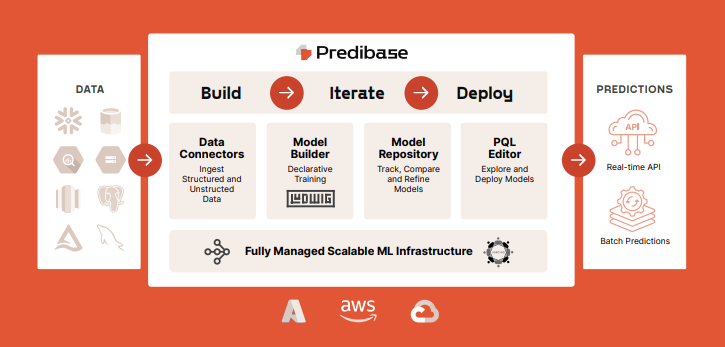 AI
AI
 AI
AI
 AI
AI
Machine learning startup Predibase Inc. today announced the commercial availability of its low-code declarative machine learning platform for artificial intelligence developers, adding new features for large language models.
The launch of its platform came as the company revealed a $12.2 million expansion to its Series A funding round, led by Felicis Ventures Management Co., LLC.
Predibase is all about helping developers and data scientists build, iterate and deploy sophisticated AI models and applications. It says it aims to help smaller companies compete with large enterprises such as Apple Inc., Meta Platforms Inc. and Uber Technologies Inc. It claims it can do that by eliminating the need to use complex machine learning tools and assemble low-level machine learning frameworks.
Using Predibase’s machine learning platform, teams simply have to define what they want to predict using a selection of prebuilt large AI models, and let the platform do the rest. It says novice users can leverage recommended model architectures to get started, while more experienced practitioners can use the platform to fine-tune any model parameter.
In this way, Predibase claims, it can reduce the time it takes to deploy machine learning models from months to just days. Since coming out of stealth mode last year, it says, more than 250 models have been trained on its platform.
The company could not have chosen a better time to launch its platform, with the rise of generative AI models like OpenAI LP’s ChatGPT capturing the imagination of just about every enterprise today. In recent months, enterprises have been scrambling to implement generative AI capabilities in order to gain a competitive advantage over their rivals.
Predibase co-founder and Chief Executive Piero Molino told SiliconANGLE that enterprises are desperate to embed machine learning capabilities into their internal and customer-facing applications. The problem, he said, is that most machine learning development tools are too complex for engineering teams to use, while their data science resources are stretched too thin. Hence, Predibase uses what it calls a “declarative” approach to machine learning development.
“Declarative means you can specify what you want the ML models to predict, and from which data, without having to specify the how,” Molino explained. “In practice, this means writing a few lines of a configuration YAML file that matches the schema of the data and declares what you want the model to predict, as opposed to writing thousands of lines of low-level machine learning code to achieve the same. Think about what Terraform does for infrastructure. It’s the same approach applied to machine learning.”
Molino said Predibase’s mission is to make it simpler for novices and experts alike to build machine learning applications and get them into production, including powerful large language models for generative AI applications. To do that, it allows users to build on top of open-source LLMs such as Ludwig and Horovod that are continually being developed and improved by the community, then fine-tune those models for their needs.
“The problem with the open-source models is that companies would need to figure out how to serve them, how to adapt them to their tasks, and how to deploy them in a cost-effective way,” Molino said. “Predibase caters to all three of those needs by making fine-tuning and deployment just a matter of writing a simple declarative YAML configuration that any developer can write.”
The latest version of Predibase also features a new, AI-powered data science copilot tool that provides recommendations to developers on how to improve the performance of the models they’re developing, as well as explanations and examples in real time.
Constellation Research Inc. Vice President and Principal Analyst Andy Thurai told SiliconANGLE that Predibase’s declarative approach to machine learning is unique, since it has never been attempted before.
“Rather than building models from scratch, users can compose the underlying workflows, architecture and tools rapidly to set up an experimentation environment,” he said. “Predibase combines that with low-code options to enable the deployment of models in production quickly, using various templates. It has the potential to bring machine learning to the masses, as opposed to relying on costly data scientists. It may be a good option for enterprises that are short of good data science resources or need to produce models and deploy them faster than their existing data science teams can do.”
In order to prove its worth, Predibase has announced a free, two-week trial version of its platform, giving every company the opportunity to see how its declarative approach can accelerate model development. The free trial is available as a fully-hosted software-as-a-service via the Predibase Cloud or a virtual private cloud in the customer’s own environment. As part of the trial, customers will be able to access LudwigGPT, the custom LLM that powers Predibase’s own data science copilot.
The platform has already been extensively tested by a number of enterprises while in beta. Dr. Volkmar Scharf-Katz, data science lead at Wells Fargo & Co., is one of its biggest advocates. He said the platform combines the simplicity of an AutoML platform with the robust flexibility and advanced features desired by data scientists. “It’s stunning to see how fast accurate results can be delivered — reducing time to value from months to days,” he said. “Moreover, Predibase allows different personas to work with the platform serving many use case scenarios in regulated domains like finance and healthcare.”
The new investment from Felicis brings Predibase’s Series A funding round up to $25.2 million, while its total funding to date now stands at $28.5 million, the company said. Predibase said it will use the extra funds to expand its go-to-market operations and develop new platform capabilities.
THANK YOU